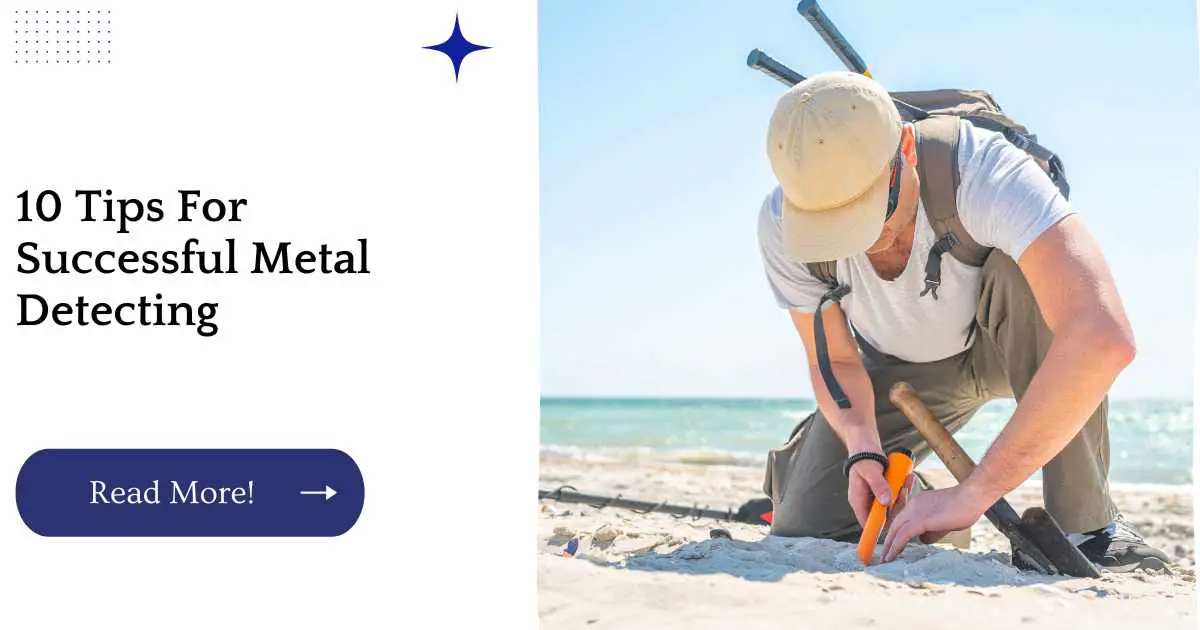Metal detecting is a fun hobby that can also be a profitable venture. But it’s not as simple or easy as some people think.
| Key Takeaways |
|---|
| Metal detecting is a popular hobby that involves using a metal detector to locate metal objects in the ground. |
| Beginners should focus on finding high-traffic areas to search, such as parks, beaches, and playgrounds. |
| Investing in a quality metal detector can improve your chances of success, but it’s important to choose one that fits your needs and budget. |
| Learning proper digging techniques and respecting the environment and property rights of others is crucial to being a responsible metal detectorist. |
| There are many resources available to help you identify and learn more about your metal detecting finds, such as online forums, reference books, and local metal detecting clubs. |
You need to know what you’re doing and how to do it right before you start hunting with your metal detector. These tips will help you get started:
Remain Focused On Your Treasure-Hunting Goal
When you go metal detecting, it’s important to stay focused on the treasure hunting goal. Don’t get distracted by other things like:
- Weather
- Time of day
- Terrain
“If you’re new to metal detecting, getting started can seem daunting. Our beginner’s guide will walk you through everything you need to know, from choosing the right equipment to finding the best locations to search.”
Choose The Right Place
- Choose a place that has been hunted before.
- Look for places close to home.
- Don’t go into areas that are too crowded.
- Choose spots with good visibility, so you can see what’s coming towards you and then react accordingly. This will help keep you safe from other people and animals, who may not be as fond of the idea of metal detecting as you are!
If possible, try to pick an area with good ground—that is, soft enough for your metal detector to penetrate but also hard enough so there aren’t any rocks or other obstacles in your way (which could mess up your machine).
Get To Know Your Metal Detector
- Get to know your metal detector.
- Learn how to set the detector up and use it.
- Learn how to maintain your metal detector.
Dress Appropriately
The first, and perhaps most important, tip is to wear clothes you don’t mind getting dirty. You probably won’t be detecting on your way to a formal event, but if you are searching for metal in the woods or along the beach, it’s best to wear something that can take some abuse.
If you’re going metal detecting on your feet and want to avoid stepping on rocks and sticks in the process (or just want better traction), consider wearing boots or shoes with non-slip rubber soles.
You should also wear sunscreen if you plan on being out in the sun for more than an hour at a time. Metal detectors can get hot while searching under trees, so keeping yourself covered may help avoid burning as well!
“Investing in a quality metal detector can make all the difference in your treasure hunting success. Check out our list of the top 15 best metal detectors for beginners to find the perfect one for you.”
Do Not Go Out When It Rains
Metal detectors don’t work well in wet conditions, and you can easily get stuck in mud or electrocuted by lightning.
You’ll also have a harder time holding your detector at the right angle with wet hands, and if it’s raining hard enough for you to need an umbrella, chances are that the ground is covered in mud anyway.
- Wear warm clothing appropriate for the weather (i.e., don’t wear shorts when it’s 5 degrees outside).
- Bring a flashlight or headlamp so you can see what you’re doing after dark; this will make it easier to avoid stepping on roots, rocks and other debris that might be hidden by darkness but could trip up unsuspecting feet as they walk around looking for treasure!
“Metal detecting can be a thrilling and rewarding hobby, but it’s important to do it safely and responsibly. Our beginner’s guide to metal detecting will give you all the information you need to get started on the right foot.”
Learn The Signs Of Digging
You’re probably familiar with the signs of digging. You know that when someone digs a hole, they will leave behind disturbed soil, upturned rocks, and damaged vegetation. But these signs can be subtle and hard to detect.
So why is it important to learn how to identify signs of digging? Because detecting without a metal detector is like playing hide-and-seek without eyes closed: you can’t see anything!
So it’s important for you to know what not knowing looks like so that you don’t waste time searching an area that has already been searched by somebody else (or even yourself).
Metal Detect In A Variety Of Places
Metal detecting is a hobby that can be enjoyed in a variety of places. If you’re new to metal detecting, it’s best to start off with an area where there are many historic sites and has been well preserved over time. For example, if you live in the United States or Canada, then I recommend visiting some parks such as the National Parks Service or State Parks.
These locations have been around for decades and may even contain items from Native American tribes that once inhabited these areas!
If you don’t have access to any historical park areas near your home or work, then try searching for abandoned properties on Google Maps/Street View before heading out into town!
Some people feel uncomfortable about visiting abandoned properties because of safety concerns (we will discuss this later), but if these precautions are taken into account then metal detecting can be fun even when exploring urban environments like city streets!
“Metal detecting is a skill that takes practice and patience to master. Our expert tips and tricks for maximizing your metal detecting skills will help you become a more successful treasure hunter in no time.”
Dig Everything That Is Worth Digging And Nothing That Is Not Worth Digging
You should dig everything that is worth digging and nothing that is not worth digging. If you are unsure if an object is worth digging, leave it for now. You can always go back later to dig it and see if it pans out.
Don’t Dig Just For The Sake Of Digging
- You can damage the environment by digging up the land.
- You can damage other people’s property by digging up their lawns and gardens.
- You could get injured, or worse, if you’re not careful when using a metal detector.
- You could get arrested if you trespass on private property without permission to do so.
- You could be fined (or worse!) if caught removing artifacts from a site that is protected under federal law like an archaeological site or historical landmark. And finally:
- Your metal detector could be confiscated or damaged by authorities if they find out that it has been used illegally in any way!
“Metal detectors have helped uncover some truly amazing historical artifacts over the years. Check out our article on the fascinating finds made with metal detectors to see some of the incredible discoveries made by treasure hunters.”
Have Manners Where You Hunt
Respect other people’s property and privacy, and don’t trespass on land that isn’t yours. If you have permission to hunt on someone else’s land, be sure to ask before digging up any artifacts or relics.
Don’t litter or vandalize anything along the way (like trees).
When detecting in parks or areas with a lot of people nearby, be courteous by being quiet while hunting so others can enjoy their time too!
And always clean up after yourself when done detecting so as not to leave behind an unsightly mess for others who may come after us 🙂 It doesn’t take long at all either–just a few minutes should be enough time if we’re using our headphones while detecting anyways!
Conclusion
I hope that these tips have been helpful for you and that you’ll be able to go out and find some treasure! Happy hunting!

Hi there! My name is Hellen James, and I’m here to talk to you about treasure hunting. I’ve been a fan of treasure hunting ever since I was a kid, and if you’re a fan of treasure hunting or just like the idea of finding a long-lost fortune, then this blog is for you.

